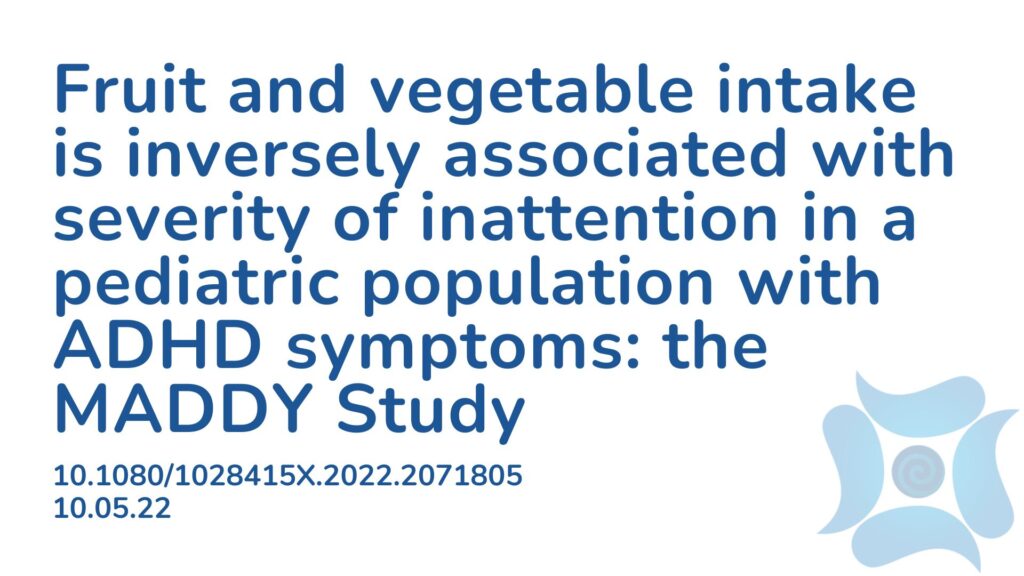Summary: Evidence has shown that Attention Deficit Hyperactivity Disorder (ADHD) may be related to low levels of neurotransmitters in the brain, and that the minerals and vitamins involved in the pathways of these neurotransmitters act as cofactors for overall brain and neurotransmitter function. Symptom severity has also been linked to vitamin and mineral deficiencies. Researchers of this paper asked parents of 134 children, who were presenting with common ADHD symptoms, to complete a detailed food questionnaire over 90 days about the type and amount of food their children typically ate. Another questionnaire also assessed symptoms – asking the parents to rate levels of inattention such as trouble staying focused, memory, regulating emotions and ability to follow instructions. The results showed that children who consumed a higher level of fruit and vegetables had less severe symptoms, showing a correlation between dietary intake and ADHD symptoms such as inattention.
Abstract:
Objectives: Attention Deficit Hyperactivity Disorder (ADHD) is a neurodevelopmental disorder with a U.S. pediatric prevalence of 8-10%. It presents with inattention and hyperactivity/impulsivity; frequently associated with emotional dysregulation (ED) symptoms common in Oppositional Defiant Disorder and Disruptive Mood Dysregulation Disorder. The etiology of ADHD is multifactorial; symptom severity is associated with diet. This study examines the association of diet quality with ADHD and ED symptoms within a pediatric research cohort.
Methods: Baseline data were analyzed for 134 children aged 6-12 years with symptoms of ADHD and ED enrolled in an RCT of multinutrient supplementation. Diet quality was based on Healthy Eating Index-2015 (HEI-2015). ADHD and ED symptoms were assessed using Child and Adolescent Symptom Inventory-5 and Strengths and Difficulties Questionnaire. Linear regression models, adjusting for covariates when necessary, determined association.
Results: The mean HEI Total Score of 63.4 (SD = 8.8) was not significantly associated with any outcome symptoms. However, after adjusting for covariates, HEI component scores for total fruit intake (β = -0.158, p = .037) and total vegetable intake (β = -0.118, p = .004) were negatively associated with inattention.
Conclusions: The lack of association with total diet quality could be explained by the relatively good baseline diet quality and mild symptom severity in this sample, along with measurement error from dietary intake estimates and relatively small sample size. These findings suggest that dietary intake may impact inattention in children with ADHD and ED: those eating less fruits and vegetables were likely to have more severe symptoms of inattention. Causality is not established by this cross-sectional analysis.
Keywords: ADHD; Dietary quality; Healthy Eating Index; children; disruptive mood dysregulation disorder; emotional dysregulation; inattention; mental health; oppositional defiant disorder.
Article Publication Date: 10.05.22
DOI: 10.1080/1028415X.2022.2071805




